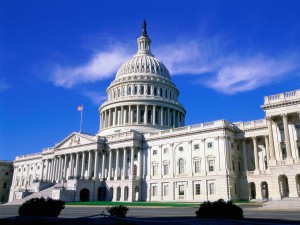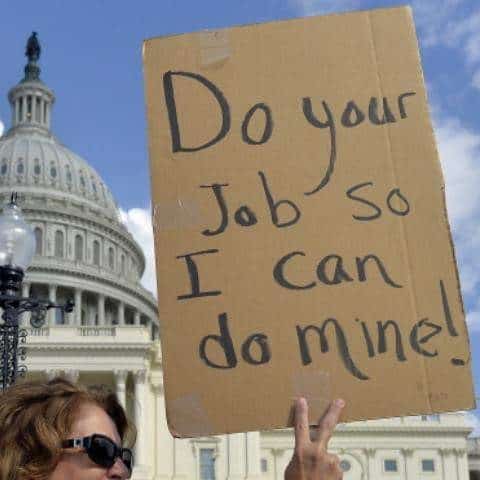Shutdown!
Sounds like scary times, doesn’t it? The government is undergoing a shutdown. What does that really mean, though? Well, basically one part of the government is having a fight with the other part over money so the first part is going on strike. That’s the simple explanation, but it’s more than just a bunch of politicians striking until the administration comes to an agreement with them over the budget, it’s hundreds of thousands of federal employees being barred from working, or furloughed, most likely without pay.
What does this mean to everyday people who don’t work for the government? Nothing scary, in fact. Social security, welfare benefits, and the mail won’t come to a screeching halt. No, only the people who the government sees as “non-essential” are out of work. That means that if you’re hoping to get a passport or go to a national park while this is going on you’re out of luck until things get back up and running. This isn’t the first time this has happened, though. The last time in 1995 into 1996 the shutdown lasted 21 days, the longest in history. Worst case scenario: this one will last a couple of weeks and the stock market will fall because of it, though historically the markets do tend to rebound once things get back on track. One positive for the everyday folks in this, though, is that the uncertainty surrounding the shutdown and the resolutions required to end it (also coupled with the deescalation of tensions in Syria) has brought down benchmark oil prices, driving pump prices down to a national average of $3.40 a gallon. (On a side note, this time of year always shows a drop off in demand for fuel, so that in tandem with budget speculation should probably bring the price down even further by December.)
The reasoning behind this is that the Republican House, having the function of passing federal budgets, does not agree with the budget being presented by the Senate Democrats. If the two groups can’t come to terms on a budget resolution the government must undergo a shutdown until the budget is passed. The major motives behind the GOP opposition are their disdain for Obamacare and the possibility of raising the debt ceiling, which is basically America’s credit line that is about to be maxed out. It’s the goal of the House GOP to decrease government spending by as much as possible, whereas the Senate Democrats wish to fund social programs such as Obamacare, that require a good bit of money to get started, that they see as being beneficial moving forward. If you remember the sequester from back in March, this is something being brought back up as a platform for bargaining between the parties. In short, according to federal budget law, if a certain sector of spending goes over the appropriated limit as laid out in the budget and compromise can’t be made the sequestration sets in, which is basically across-the-board spending cuts of equal percentages in all sectors. This was something that hurt both the Democrats and the Republicans, and now the Republicans are trying to use the spending cuts put into place then that negatively effect social programs supported by the Democrats as a bargaining chip, suggesting lifting certain cuts in exchange for delaying Obamacare and whatnot.
 All legal and financial details aside, let’s think about what’s happening here. These two parties are so divided and they have the government itself divided with them. Both the Democrats and the Republicans try and say they’re on the side of the “little guy” and everyday American’s, but with one side increasing monthly expenses for millions of Americans for for healthcare (this being the faction that would prefer to remain uninsured) and the other side costing practically a million people money by forcing them to strike for an indefinite amount of time without pay, which side really sounds like they care about the working man? We hear a lot of talk about people who are in poverty and “can’t” find work, we hear a lot about business owners who are afraid of having their vastly bloated incomes taxed at higher rates, we hear a lot about people with pre-existing conditions who couldn’t find healthcare before but now can, and we hear a lot about immigrants and people of different backgrounds being marginalized. But what about the average people? The middle class. What about people who do have a job, but one that doesn’t pay a lot? What about people who aren’t sick or immigrants or discriminated against in any way? What about people who are healthy and young and don’t need constant medical attention? Do either one of the parties enforcing new taxes, fines, and furloughs give a damn about the average American? Clearly not.
All legal and financial details aside, let’s think about what’s happening here. These two parties are so divided and they have the government itself divided with them. Both the Democrats and the Republicans try and say they’re on the side of the “little guy” and everyday American’s, but with one side increasing monthly expenses for millions of Americans for for healthcare (this being the faction that would prefer to remain uninsured) and the other side costing practically a million people money by forcing them to strike for an indefinite amount of time without pay, which side really sounds like they care about the working man? We hear a lot of talk about people who are in poverty and “can’t” find work, we hear a lot about business owners who are afraid of having their vastly bloated incomes taxed at higher rates, we hear a lot about people with pre-existing conditions who couldn’t find healthcare before but now can, and we hear a lot about immigrants and people of different backgrounds being marginalized. But what about the average people? The middle class. What about people who do have a job, but one that doesn’t pay a lot? What about people who aren’t sick or immigrants or discriminated against in any way? What about people who are healthy and young and don’t need constant medical attention? Do either one of the parties enforcing new taxes, fines, and furloughs give a damn about the average American? Clearly not.
All of these battles both parties are fighting are focused more on the long-term, which makes sense. And sure, it might sound shortsighted to focus on the now. But a lot of people out there do. Some Americans don’t have the financial stability to plan for the long-term; some have to just focus on having the money they need for right now so they can pay their bills. Inflation is on the rise, the prices people pay for gas (be they dropping) are higher than they should be – all of the things people have to be able to afford these days really stack up fast. With everyone pretty much being forced to assimilate with new technologies cellphone bills are at new highs; internet, digital cable – granted these aren’t absolute necessities, living without them can make people feel like they’re at rock bottom with how the media has integrated technology into everyday life and made people feel like they need to keep up. Where is the special interest group for these Americans? Those who work in service industries, those who live alone and own a vehicle, where is their lobby? Which politician or pundit out there has said a word about this group of marginalized Americans during all this financial hubbub? Should holding a steady job, being healthy, and living independently be a punishable lifestyle? Do you have to be living on the street and on the verge of death for the government to consider helping you? How about an aged, successful businessperson who has college funds set up for their children with income they’ve made from their entrepreneurial efforts?
Bottom line, people need to stop dealing in absolutes. No one and nothing is perfect, but we all need to refocus our energy on what’s best for the most of us and what’s best the soonest. Sure, if we want to make major changes the beginning implementations are going to need some tweaking to make them better; trial and error, that sort of thing. But bickering and ignoring real, working people who contribute to this nation’s success is not the way to go about it. Maybe the changes we’re experiencing right now are the lesser of the evils we’ve been presented with for now, and if that’s the case, oh well; looks like we’ll just have to deal with it. But we pay a lot of people a lot of money as a nation to make these things work, so we should hold them accountable when they act like children or screw things up.



